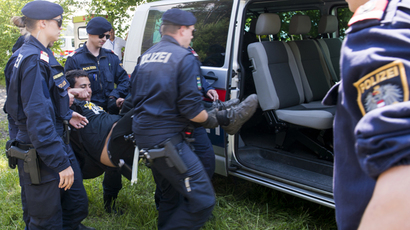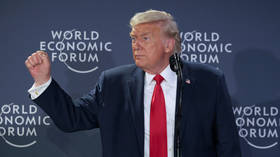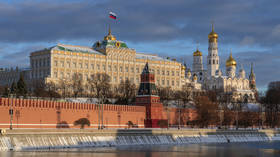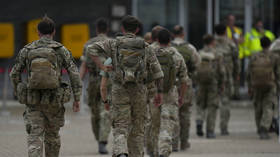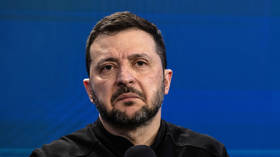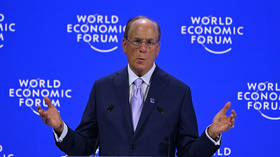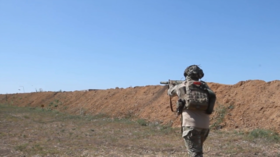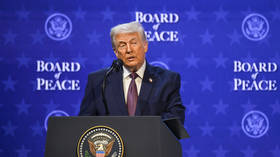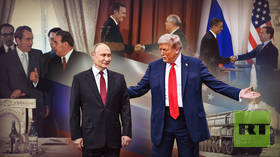Bilderberg 2016: World’s top brass meets in Dresden to talk migrants, Brexit and US elections
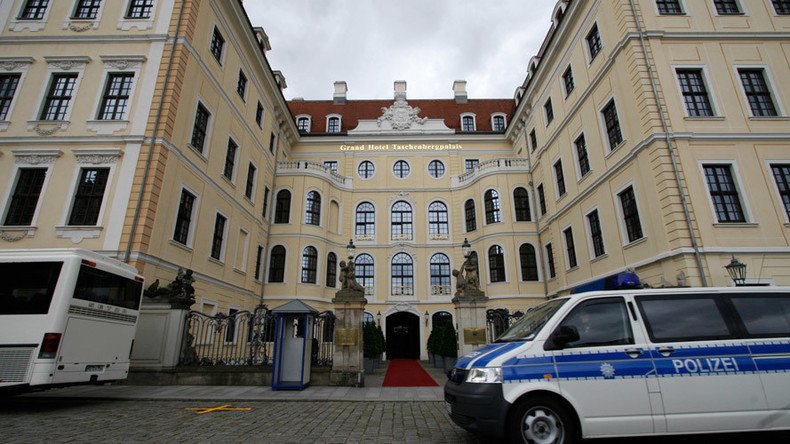
The world’s most intriguing gathering, the Bilderberg Group, is being held in Dresden this week, with the West’s rich and powerful among other things set to meditate on the migrant crisis, the next US president and UK’s referendum on leaving the EU.
Some 126 high-powered figures from 20 countries have made it to the guest list, which the Group made public, along with the agenda of this year’s event. Combined, the two documents give a rather detailed scope on what exactly the attendees of the 64th Bilderberg conference will be mulling over during the upcoming four days.
"VIP Gäste" explains the man laying a new truckload of concrete blocks outside the #Bilderberg venue in #Dresdenpic.twitter.com/xHtjnfYJW9
— Charlie Skelton (@deYook) June 7, 2016
Two prime ministers, four finance ministers, the former US Secretary of State, Henry Kissinger, IMF head Christine Lagarde, European Commission vice-president Frans Timmermans and the former president of the European Commission, Jose Manuel Barroso, are all on the guest list, along with dozens of politicians, entrepreneurs and even former heads of the CIA and MI6.
security cordon being assembled outside Taschenbergpalais Hotel, #Dresden, for this year's #Bilderberg (June 9-12) pic.twitter.com/aKZNfkATYa
— Charlie Skelton (@deYook) June 6, 2016
One of the conference habitués, British Chancellor George Osborne, will pass on this year’s event. Instead, the meeting will have to make do with Irishman Michael O’Leary, the billionaire “bully” boss of the Ryanair airline, as well as 9 high-ups from the UK.
The gathering will be chaired by a French count, Henri de Castries, who is also the CEO of the global insurance and investment giant AXA.
security ramping up for #Bilderberg 2016... "at least 400 police" on duty outside #Bilderberg says Dresden paper pic.twitter.com/KeyBqsEvrf
— Charlie Skelton (@deYook) June 8, 2016
Routinely, this year’s agenda can hardly be called detailed, yet the main points of focus are outlined as European unity, migration, US political landscape, China, the Middle East, Russia and the “precariat and middle class.”
The European migrant crisis, which has been gradually worsening during the past year, is up for discussion, and might become a number one priority for attendees, as with hundreds of thousands of newcomers Europe has gained yet another problem – the voters’ defection to nationalist parties.
The agenda item “European unity” indicates that the upcoming UK vote on leaving the EU is to be among the hot topics of the conference, with such possibility threatening the future of the European Union, which as some believe was actually invented by the Bilderberg Group.
During last year’s conference, Bilderberg was rather supportive of Hillary Clinton in her presidential claim, which leads to the conclusion that Donald Trump’s success in the GOP primaries will come under the Bilderberg spotlight. Moreover, anti-Trump Senator Lindsey Graham’s name on the guest list hints that the Group is to brood over how to prevent Trump from defeating Clinton.
The Bilderberg Group’s first meeting was held in 1954. It’s become an annual event ever since, with some 120-150 politicians, bankers, media heads, business moguls and royalty invited to take part in discussing the most vital global problems. Every meeting is held under the Chatham House Rule that allows participants to use the information they received, but bans them from disclosing the identity and the affiliation of the person the information came from. Also as a break from official international summits and councils, no record is kept of who attendees meet or what exactly is discussed and they’re not required to propose any resolutions, vote or issue policy statements, which allows them time and opportunity to discuss and gather insights freely.
To ensure security, the German military has been drafted in ahead of the conference and a high new fence has been installed around Dresden’s Hotel Taschenbergpalais Kempinski, where the conference is to be held.
Besides ensuring safety, army officers will also do the job of keeping the attendees safely away from the press and protesters for the entire four-day conference. Last year’s conference in Austria was accompanied by mass protests, with demonstrators accusing the attendees of corruption and elitism.
Waving conspiracy theories that surround the conference due to its behind-closed-doors nature, organizers proclaim the event “never sought any public attention,” being merely a “forum for informal discussions about megatrends and major issues facing the world.”

